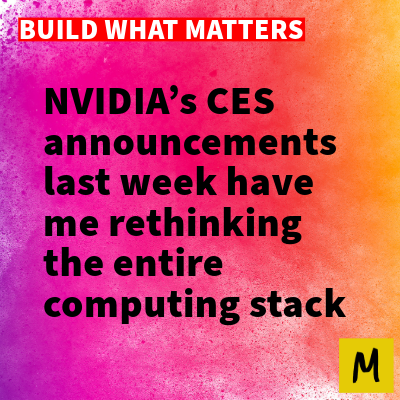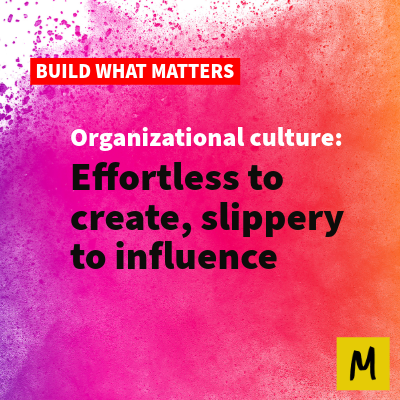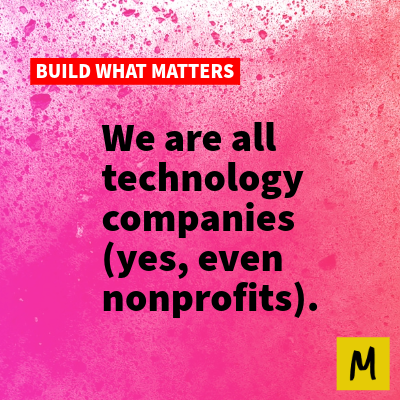
NVIDIA’s CES announcements last week have me rethinking the entire computing stack
Last week, Jensen Huang’s CES 2025 keynote had me rethinking how hardware and software work together. With NVIDIA’s Blackwell GPU, the hardware itself is now writing code—in real time, tailored to user needs, and without external software. Whoa.
This isn’t just about faster graphics—it’s a redefinition of the computing stack, potentially impacting industries from healthcare to autonomous vehicles to marketing and fundraising. I break it all down, including why this evolution is exciting (and a little daunting).

Being a good product coach
From Marty Cagan: “Good product coaches define their success by your success in achieving outcomes. Whether that’s solving a tough problem in product discovery, or coming up with an effective product strategy that delivers the necessary business results, or preparing you for a successful promotion.”

Innovation at-scale is a team sport
Top-down leadership doesn’t work when you are talking about fostering real innovation. It’s like suspending someone by the collar over a cliff edge and telling them to write an award winning novel. If a company wants to innovate at-scale, it means fully embracing the fact that innovation is a human capital venture (even with AI involved). And humans need to feel respected, included, heard and mentored.
Start-ups need visionary founders. Scale-ups need visionary teams with big problems to solve and room to do it.

Three head-nodding moments from a recent interview with Spotify CEO, Daniel Ek
Three takeaways from listening to Spotify co-founder and CEO Daniel Ek in a recent conversation. The Spotify story is not about riding the macro streaming trend of the 2010’s — it is about defining authentic culture and weathering the inevitable “Day 2” point(s) of no return every company faces— and defining a category along the way.

Capacity for creating (real) strategy is a company health-ometer
Organizations fall down on strategy in two ways. First, they hesitate to make the big trade-offs that companies like Netflix and Apple do every day. Second, they try to be “the leader” and make everyone happy. Real strategy work lays this paradox bare and calls companies to do the hard work of deciding not only what to say yes to this quarter, but importantly, what to say no to.

Seven ideas about leadership that feel most true
Good leadership is difficult. But there is no career achievement more worthwhile than becoming someone people genuinely wish to follow.

What I mean by Innovation and Product Coaching
Innovation and product coaching helps technology (and non-tech) teams get great at determining what they build, how they build and how they structure themselves to build— things that matter.

Organizational culture: Effortless to create but slippery to influence
Real influence is what shapes culture in an organization. What creates real influence? Real humans doing work with extreme competence and humility. (Real leadership.) Fortunately, we all can learn real leadership by being around others who know how to do it. If you have ever been around a real leader, you know. It changes you. Up your own leadership level.

“Product” just means creating an outcome
Like Seth Godin's distinction that marketing is either "understanding the customer’s desires so we can connect with them" (the good kind of marketing) or "pressuring the buyer" (the not good kind of marketing), the notion of “product” can be similarly defined.

The words we use to describe innovation absolutely suck
Why the words we use to describe the crown jewels of business are utterly not up to the task of the real work.

Ticketmaster: Ripe for disruption
What the recent Taylor Swift on-sale (on-fail?) tells us about crafting great customer experience in even the most challenging situations.

On fois gras, CEOs and disruption
Disruption is a fact. Strong companies build innovation muscles to face it directly.

We all benefit from generosity
I had an experience today that changed the course of my career. Someone I don’t know well was utterly generous. I hope to pass it on.

Good strategy, bad strategy (and why I love what I do)
Good strategy says as much about what a company will not do, as what it will. It defines. It clarifies. Good strategy is hard. Bad strategy is cheap. Richard Rumelt’s timeless Good Strategy Bad Strategy book has me thinking about this more… and has me fired up about my own career.

We are all technology companies. (Yes, even nonprofits.)
We are all technology companies. There, I said it. And as noncontroversial (obvious?) as that sounds to some of you, it undoubtedly makes others of you wince. Whichever end of the spectrum you fall on this idea, here is why I think a we-are-all-tech-companies stance is a foundational position that benefits any kind of company. Yes, even nonprofits.

The cheeky backside of product potential … the not-yet-formed
When you build or market something, you better have a plan for balancing the sparkling potential that will sell your product vs. the not-yet-formed backside of innovation that could seriously disappoint.
